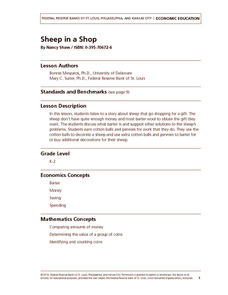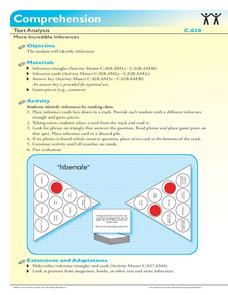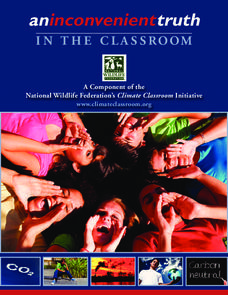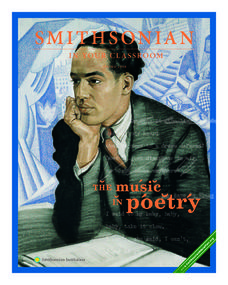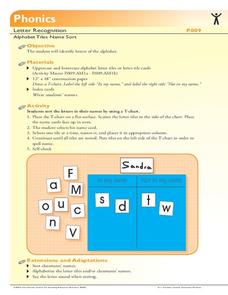Florida Center for Reading Research
Fact Versus Opinion
Is that a fact or an opinion? Learners explore the difference using this pocket chart activity during which partners read statement cards and determine whether they are facts or opinions.
Federal Reserve Bank
Sheep in a Shop
What do you think sheep might be able to barter when they don't have quite enough to buy a gift? Your pupils can find out this and much more during this lesson about Sheep in a Shop, spending, saving, and bartering.
Federal Reserve Bank
Glo Goes Shopping
Making decisions can be very difficult. Show your class one way to evaluate choices with this lesson plan, which is inspired by the book Glo Goes Shopping. Learners practicing using a decision-making grid with the content of the story...
Federal Reserve Bank
Bunny Money
Teach your class about saving, spending, and goal setting with a story about a couple of bunnies who went shopping and related activities. Learners keep track of the bunnies' spending, practice identifying long- and short-term savings...
Florida Center for Reading Research
Comprehension: Text Analysis, More Incredible Inferences
Reinforce inference skills with a learning game! Scholars read scenarios on cards and match them to a written inference on the triangle. The first pupil to match all their inferences wins!
Florida Center for Reading Research
Advanced Phonics: Syllable Patterns, Syllable Game
A game designed to support advanced phonics instruction challenges scholars to read and break a word into syllables. If the player is correct, they move their game piece forward on the board. Whoever gets to the end first wins!
National Wildlife Federation
An Inconvenient Truth in the Classroom
Global warming — what a hot topic! A thorough unit challenges learners to research, read, explore, and write about carbon, its role and increasing nature in our atmosphere, and how global warming is affecting lives and environments...
WindWise Education
How Does a Windmill Work?
Can my windmill pick up a weight? Given the same set of materials, groups design and build the most efficient windmill. On the first day, groups concentrate on getting a windmill to spin, while on the second day, they modify their...
WindWise Education
Which Blades Are Best?
If I change the length, will they work better? After brainstorming the variables of wind turbine blade design, groups choose one variable to isolate and test. The groups then present their data to the class in order for all to have the...
WindWise Education
How Does a Generator Work?
I get a charge out of this. In order to learn how a generator works, groups build and test one in this ninth lesson of the series. The generators are tested at low speed and high speed to determine the watt output and whether they have...
WindWise Education
How Can I Design Better Blades?
Small groups use information they have learned about blade construction to design, build, and test their own concepts. The teams compete in order to determine which design has the best average power output.
NOAA
History's Thermometers
How is sea coral like a thermometer? Part three of a six-part series from NOAA describes how oceanographers can use coral growth to estimate water temperature over time. Life science pupils manipulate data to determine the age of corals...
Howard Hughes Medical Institute
Niche Partitioning Activity
Dinnertime on the African savanna is a highly choreographed event! Introduce young ecologists to the concept of niche partitioning through a hands-on activity. Pupils research animal behaviors and use data to develop an understanding of...
Florida Center for Reading Research
Comprehension: Text Analysis, Fiction and Nonfiction Find
Scholars analyze fiction and nonfiction text and fill in a worksheet detailing the text's title, genre, and reason for its classification.
Florida Center for Reading Research
Vocabulary: Word Meaning, Dictionary Cube
Scholars work together to define words and answer questions using a dictionary cube.
Spectrum
Grade 5 Standardized Test Prep
Here you'll find a great sampling of practice standardized test questions organized into four sections: ELA, mathematics, social studies, and science. Help your learners become familiar with the types of multiple-choice questions...
Smithsonian Institution
Smithsonian In Your Classroom: The Music in Poetry
Take poetry off the page and put it into terms of movement, physical space and, finally, music with this series of three lessons from the Smithsonian Institution. This resource introduces students to two poetic forms that originated as...
Curated OER
2001 AP® United States History Free-Response Questions
Rigorous and challenging, the AP Test for AP United States History contains a document-based question (with nine documents), as well as two additional free-response questions. Students who are preparing for the test will appreciate the...
Florida Center for Reading Research
Alphabet Borders
Help young scholars name the letters of the alphabet. They use the provided alphabet border and letter cards to take turns saying and finding various alphabet letters. This simple game can be extended by having learners focus on the...
Florida Center for Reading Research
Recognizing Letters
Boost letter recognition with an activity that challenges young scholars to match a plastic letter to one printed on a card.
Florida Center for Reading Research
Phonics: Letter Recognition, Alphabet Tiles Name Sort
Beginning readers practice identifying alphabet letters using upper and lower case letter tiles. Each class member is given a T-chart, letter tiles, and a name card. They then separate the letter tiles in their name from those not in...
Florida Center for Reading Research
Fluency: Letter Recognition, Speedy Alphabet Arc
On your mark, get set, match! Learners use a complete set of letters, matching each to its outlined letter on an arc. As they choose letters, they name them aloud. For added difficulty, another arc is missing most of its letters to...
Florida Center for Reading Research
Phonics: Letter Recognition, Hungry Letter Mouse
Scholars take turns writing and identifying letters on a whiteboard. Learner one writes a letter; learner two finds it on the alphabet strip. If they are correct, Mr. Mouse gets to eat that letter, and if they are incorrect, Mr. Mouse...
Florida Center for Reading Research
Letter Recognition: Tap Stack
Practice letter recognition using this fun alphabet game! Focusing on a suggested six target letters, this partner activity has learners saying and recognizing letter names as quickly as possible. Using a randomly chosen letter as the...
Other popular searches
- Education News
- Media Education Propaganda
- Media Education Esl
- Lesson on Media Education
- On Line Media Education
- Media Education Lesson Plans
- Media Education Tabloid
- Online Media Education
- Media Education Math
- Media Education Blogging
- Media Education Art Projects
- Media Education Blagging

